
John Cabell Breckinridge was an American lawyer, politician, and soldier. He represented Kentucky in both houses of Congress and became the 14th and youngest-ever vice president of the United States. Serving from 1857 to 1861, he took office at the age of 36. He was a member of the Democratic Party, and ran for president in 1860 as a Southern Democrat. He served in the U.S. Senate during the outbreak of the American Civil War, but was expelled after joining the Confederate Army. He was appointed Confederate Secretary of War in 1865.

John Breckinridge was an American lawyer, slave-owning planter, soldier, and politician in Virginia and Kentucky. He served several terms each in both state's legislatures before legislators elected him to the U.S. Senate. He also served as United States Attorney General during the second term of President Thomas Jefferson. He is the progenitor of Kentucky's Breckinridge political family and the namesake of Breckinridge County, Kentucky.
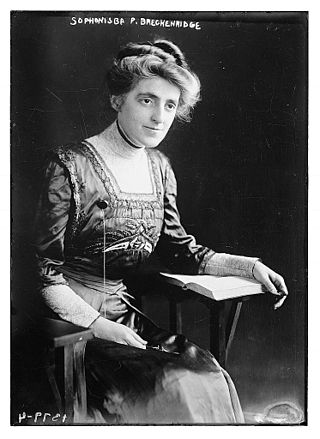
Sophonisba Preston Breckinridge was an American activist, Progressive Era social reformer, social scientist and innovator in higher education. She was the first woman to earn a Ph.D. in political science and economics then the J.D. at the University of Chicago, and she was the first woman to pass the Kentucky bar. In 1933, President Franklin D. Roosevelt sent her as a delegate to the 7th Pan-American Conference in Uruguay, making her the first woman to represent the U.S. government at an international conference. She led the process of creating the academic professional discipline and degree for social work. During her life she had relationships with Marion Talbot and Edith Abbott.

Henry Cornelius Burnett was an American politician who served as a Confederate States senator from Kentucky from 1862 to 1865. From 1855 to 1861, Burnett served four terms in the United States House of Representatives. A lawyer by profession, Burnett had held only one public office—circuit court clerk—before being elected to Congress. He represented Kentucky's 1st congressional district immediately prior to the Civil War. This district contained the entire Jackson Purchase region of the state, which was more sympathetic to the Confederate cause than any other area of Kentucky. Burnett promised the voters of his district that he would have President Abraham Lincoln arraigned for treason. Unionist newspaper editor George D. Prentice described Burnett as "a big, burly, loud-mouthed fellow who is forever raising points of order and objections, to embarrass the Republicans in the House".

John Young Brown was an American politician from the U.S. Commonwealth of Kentucky who represented the state in the United States House of Representatives and served as its 31st governor. Brown was elected to the House of Representatives for three non-consecutive terms, each of which was marred by controversy. He was first elected in 1859, despite his own protests that he was not yet twenty-five years old, the minimum age set by the Constitution for serving in the legislature. The voters of his district elected him anyway, but he was not allowed to take his seat until the Congress' second session, after he was of legal age to serve. After moving to Henderson, Kentucky, Brown was elected from that district in 1866. On this occasion, he was denied his seat because of alleged disloyalty to the Union during the Civil War. Voters in his district refused to elect another representative, and the seat remained vacant throughout the term to which Brown was elected. After an unsuccessful gubernatorial bid in 1871, Brown was again elected to the House in 1872 and served three consecutive terms. During his final term, he was officially censured for delivering a speech excoriating Massachusetts Representative Benjamin F. Butler. The censure was later expunged from the congressional record.

Joseph Desha was a U.S. Representative and the ninth governor of the U.S. state of Kentucky. After the revocation of the Edict of Nantes, Desha's Huguenot ancestors fled from France to Pennsylvania, where Desha was born. Eventually, Desha's family settled near present-day Gallatin, Tennessee, where they were involved in many skirmishes with the Indians. Two of Desha's brothers were killed in these encounters, motivating him to volunteer for "Mad" Anthony Wayne's campaign against the Indians during the Northwest Indian War. Having by then resettled in Mason County, Kentucky, Desha parlayed his military record into several terms in the state legislature.

George Washington Johnson was the first Confederate governor of Kentucky. A lawyer-turned-farmer from Scott County, Kentucky, Johnson, a supporter of slavery who owned 26 slaves, favored secession as a means of preventing the Civil War, believing the Union and Confederacy would be forces of equal strength, each too wary to attack the other. As political sentiment in the Commonwealth took a decidedly Union turn following the elections of 1861, Johnson was instrumental in organizing a sovereignty convention in Russellville, Kentucky, with the intent of "severing forever our connection with the Federal Government." The convention created a Confederate shadow government for the Commonwealth, and Johnson was elected its governor. This government never controlled the entire state though it controlled about half the state early in the war, Kentucky remained in the Union after 1862 throughout the rest of the war.

Madeline (Madge) McDowell Breckinridge was an American leader of the women's suffrage movement in Kentucky. She married Desha Breckinridge, editor of the Lexington Herald, which advocated women's rights, and she lived to see the women of Kentucky vote for the first time in the presidential election of 1920. She also initiated progressive reforms for compulsory school attendance and child labor. She founded many civic organizations, notably the Kentucky Association for the Prevention and Treatment of Tuberculosis, an affliction from which she had personally suffered. She led efforts to implement model schools for children and adults, parks and recreation facilities, and manual training programs.

Desha Breckinridge was the editor and publisher of the Lexington Herald from 1897 to 1935. In 1898, he married Madeline McDowell, who became nationally known as Madeline McDowell Breckinridge. He was a brother of Sophonisba Breckinridge and the son of William Campbell Preston Breckinridge, a member of Congress from Kentucky and a lawyer. His grandfather was the abolitionist minister Robert Jefferson Breckinridge, and his great-grandfather was John Breckinridge.
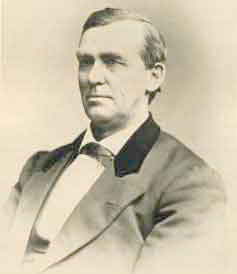
Milton Jameson Durham was a U.S. Representative from Kentucky and served as First Comptroller of the Treasury in the administration of President Grover Cleveland. An alumnus of DePauw University and the University of Louisville School of Law, Durham held no political office prior to his appointment as a circuit court judge by Governor Beriah Magoffin in 1861. He was elected to represent Kentucky's Eighth District in Congress in 1872. He served three terms and was a member of several finance-related committees. He was narrowly defeated for renomination in 1878 by Philip B. Thompson, Jr. at the district's Democratic nominating convention.
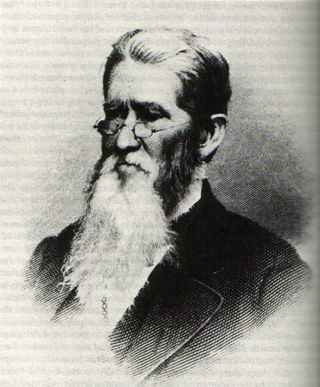
Robert Jefferson Breckinridge was a politician and Presbyterian minister. He was a member of the Breckinridge family of Kentucky, the son of Senator John Breckinridge.
The Breckinridge family is a family of public figures from the United States. The family has included six members of the United States House of Representatives, two United States Senators, a cabinet member, two ambassadors, one United States Vice President, and one unsuccessful candidate for United States President. Breckinridges have served as college presidents, prominent ministers, soldiers, and theologians and in important positions at state and local levels. The family was most notable in Kentucky and most prominent during the 19th century, during nearly one third of which a member of the family served in the United States Congress.

Joseph Cabell Breckinridge Sr. was a Union Army officer from Kentucky during the American Civil War. In later life, he became a brigadier general in the U.S. Regular Army and Inspector General of the Army as well as a major general of volunteers in the Spanish–American War.
Robert Jefferson Breckinridge Jr. was a Kentucky politician and a member of the Breckenridge political family. He was the son of Robert Jefferson Breckinridge and brother of William Campbell Preston Breckinridge. He was born in Baltimore, Maryland. He served as a colonel in the Confederate Army in the Civil War. He later represented Kentucky in the First Confederate Congress from 1862 to 1864. After the war he served as a judge. He married Katharine Morrison in 1856.
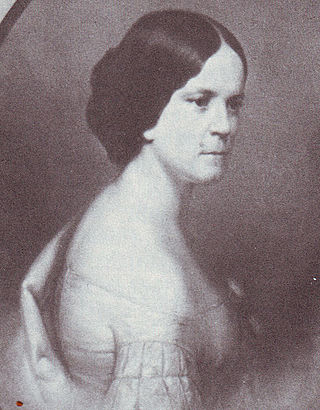
Mary Cyrene Breckinridge (née Burch; August 16, 1826 – October 8, 1907) was the wife of John C. Breckinridge and served as the second lady of the United States from March 4, 1857, until March 4, 1861, while her husband was the 14th vice president of the United States.
Joseph Cabell Breckinridge was an American lawyer, soldier, slaveholder and politician in Kentucky. From 1816 to 1819, he represented Fayette County in the Kentucky House of Representatives, and fellow members elected him as their speaker. In 1820, Governor John Adair appointed Breckinridge Kentucky Secretary of State, and he served until his death.
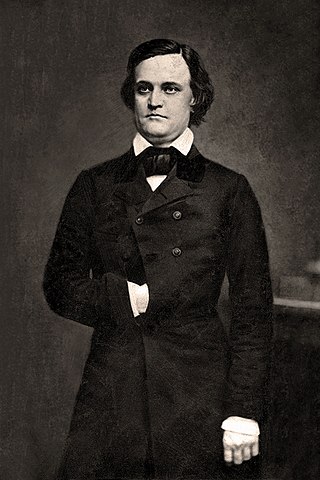
The political career of John C. Breckinridge included service in the state government of Kentucky, the Federal government of the United States, as well as the government of the Confederate States of America. In 1857, 36 years old, he was inaugurated as Vice President of the United States under James Buchanan. He remains the youngest person to ever hold the office. Four years later, he ran as the presidential candidate of a dissident group of Southern Democrats, but lost the election to the Republican candidate Abraham Lincoln.
Breckinridge is a surname, and may refer to:
The Breckinridge family exerted a powerful influence in the divided slave-state of Kentucky, with Breckinridge County dating back well before its current constitution of 1799. They were viewed as southern aristocracy, counting many Confederate generals among their cousins. But family members also fought in the Union army, and supported Lincoln throughout the conflict.
Charles Henry Breckinridge was a U.S. Army officer from Kentucky during the American Civil War.
















